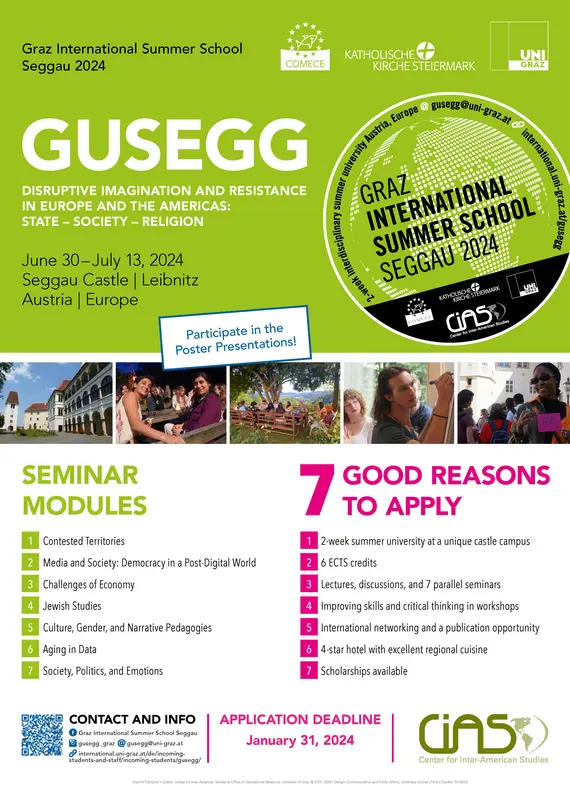Six Good Reasons to Apply
- 2-week summer university with a campus atmosphere at Seggau Castle
- Open to all students in the Master's programme English and American Studies (regular and Joint Programme)
- Credits can be recognised for participation and a seminar paper
- Lectures, panel discussions and 7 parallel seminar modules (small groups)
- Discussions and networking opportunities with international lecturers and guests
- All-inclusive-package (tuition, meals, accommodation, extra-curricular program and field trips)
- Develop skills in Public Speaking, Academic Writing, and Critical Thinking
About
"GUSEGG - Graz International Summer School Seggau" is designed for internationally oriented, highly motivated students from all disciplines, who wish to deepen their understanding of current European and international affairs by studying and discussing global developments and challenges within the context of transformation processes and demographic change reflecting aspects of individual, social, political, religious, cultural, literary, regional, economic, cohort and national identities.
With a complete European integration in mind, the summer school contributes to a better understanding on a European as well as international level. Thematic seminars in the respective fields allow students to strengthen their understanding of complex issues in their study areas. Cross-cultural teaming and transferable skills workshops add an important aspect to the summer school and give students the opportunity to acquire additional skills that will allow them to succeed on the international labour market and become cross-culturally competent experts.
The target groups for the summer school are highly motivated students following their studies at master level within the Joint Degree programmes or any other programme allowing for the recognition of the summer school courses within their study programme.The summer school is affiliated with the Joint Programme, thus Joint Programme students can have 6 ECTS recognised towarsd their mobility semester. Students of the regular track also have the opportunity to have credits recognised.
Summer School 2024: Camps, Carceral Imaginaries, and Criticial Interventions
This international conference “Camps, Carceral Imaginaries, & Critical Interventions,” which is co-sponsored by the Center of Inter-American Studies at the University of Graz and the Department of English at the University of Puerto Rico at Río Piedras, offers a forum within which graduate students, scholars, writers, practitioners, and former prisoners held in Guantánamo Bay can come together to productively consider incarceration, internment, and related technologies of enclosure as well as examples of resistance, protest, and struggle that have emerged in reaction to them.
The history of the Americas shows that numerous groups have been confined in camps. These include detainees, inmates, prisoners, internally displaced people, asylum seekers, refugees, migrants, children, racial, ethnic, and sexual minorities, activists, and victims of political persecution, among others. It traverses events such as Cuba’s War for Independence, Japanese internment, the Viet Nam War, U.S. military operations at Guantánamo Bay, Cuba, the corporatization of migrant detention, and the construction of camps at the U.S. southern border, among other events, many of which remain under-documented.
In popular discourse, camps are often associated with short-term humanitarian operations related to the provision of shelter, food, and access to legal assistance. While some camps have functioned this way, scholars from numerous fields in the humanities and social sciences have signaled concerns about their proliferation and the extent to which they facilitate far-reaching cycles of punishment and abuse. Their work demonstrates that the body politic frequently deems the people held in camps to be threatening and undeserving of “full rights” while contributing to their misrepresentation and marginalization. These and related insights prompt us to problematize how camps have been used as well as the assumption that they are necessary or effective.
Building on the first conference in this series, in which five former detainees from Guantánamo discussed their lives in military prison camps and the memoirs they have written about their experiences, the conference seeks to cultivate interdisciplinary and intersectional exchanges that creatively navigate the space between “free society” and knowledge about encampment and a broad typology of camps and camp-like institutions. These include “assembly centers,” barracoons, slave depots, detention and internment camps, prisoner-of-war camps, labor camps, “black sites,” offshore detention centers, concentration and re-education camps, and prison units, among others.
While proposals from all fields are welcome, the organizers anticipate ample participation from persons from the following fields: inter-American studies, literary studies, cultural studies, legal studies, critical prison studies, Caribbean studies, critical discourse analysis, sociocultural analysis, history. Graz is an opportune environment for work on camps, Guantánamo, and rights given its status as the first “Human Rights City” in Europe.
The conference will include keynotes and presentations by former prisoners, academics, and prize-winning writers and poets. Planning of an array of other activities that will enrich the experience of participants is underway. These will be posted on our website as they are confirmed.
The deadline for the call of papers is January 31, 2024. For more information please see the summer school's leaflet(1.1 MB)!

